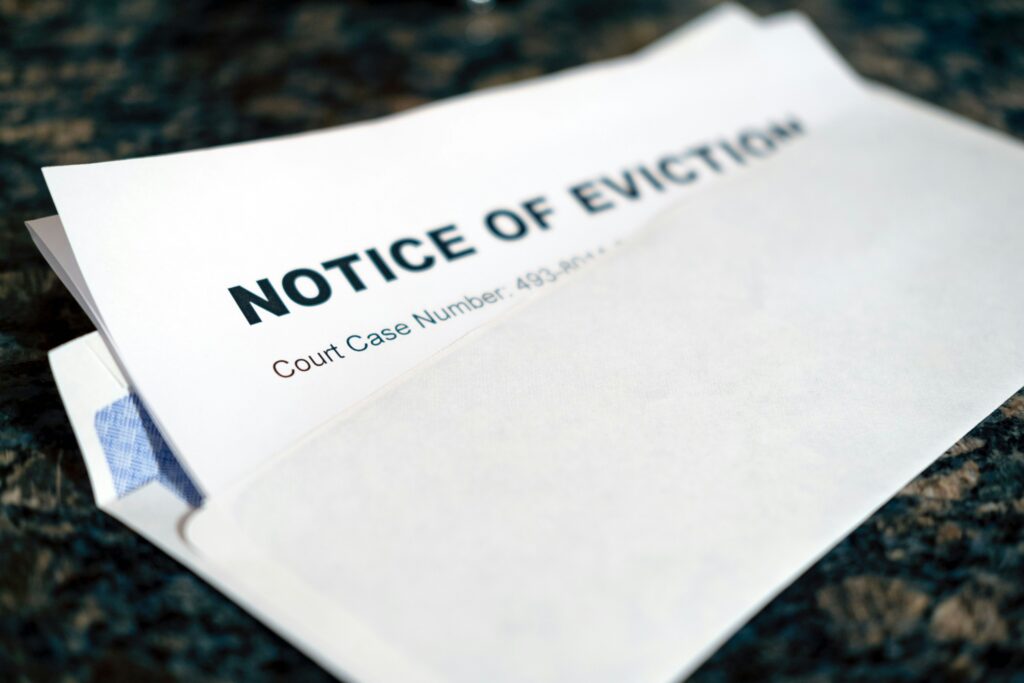
Owning rental property can be a lucrative investment, but it comes with its share of challenges. One of the most frustrating and stressful situations a landlord can face is discovering that a tenant has damaged or destroyed property. Whether it's broken windows, ruined carpet, or extensive structural damage, handling these incidents swiftly and effectively is crucial to maintaining the value of your property. In this roundup blog, we'll guide you through the essential steps to take if you find yourself dealing with tenant-caused damage.
- What Constitutes as Property Damage?
- How Different Types of Tenant Damage Impact Property Value + Options for Property Owners
- What To Do If a Tenant Damages Your Property
- Landlord Rights When a Tenant Destroys Your Property
- Frequently Asked Questions About Tenants Destroying Rental Properties
What Constitutes as Property Damage?
Property damage refers to any harm or destruction inflicted on a rental property by a tenant that diminishes its value or functionality—whether intentional or accidental. This can range from minor issues like stained carpets and broken hardware to more severe problems such as damaged appliances, vandalized walls, or significant structural damage. Understanding the extent of the damage is crucial for taking appropriate action and ensuring your property remains in good condition.
How Different Types of Tenant Damage Impact Property Value + Options for Property Owners
Here’s what our cash home buying experts say about how tenant damage impacts property value and what the options are for property owners.
Remediation to Make the Property Livable Again
“Water damage due to tenant negligence or vandalism can make the property unlivable if mold starts to grow until remediation takes place.”
Assume the Problem Was Happening Long Before It Was Reported & Inspect the Property
“In the case of water leaks of any kind, big or small, assume that the leak has been occurring long before it was reported. If an appliance such as a dishwasher or refrigerator has a leak that goes unaddressed, for instance, more extensive and expensive water damage to the nearby flooring or drywall may have occurred. We recommend purchasing a low-cost digital moisture meter to quickly check the moisture content of wood, concrete and drywall. If there is an accessible crawlspace, the flooring should be inspected from there as well. The security deposit is there if needed, but should only be used if no other recourse is available. You’ll want to keep as much of the security deposit available as possible. If there are damage issues now, you’ll want to assume there may be issues later.”
Deductions from Security Deposit, Additional Charges for Tenant, or Legal Action
“The consequences might include deductions from the security deposit to cover repairs, additional charges if the damage exceeds the deposit amount, or, in severe cases, legal action that could lead to criminal charges. Tenants are liable for the cost of repairs not covered by normal wear and tear, underscoring the importance of maintaining the property’s condition. The law recognizes that tenants are liable for damages they cause to a rental property and should pay for those damages, regardless of whether they were accidental or deliberate. Any damages to the property impact the property value. Quickly document and assess property damage to determine the next steps. Landlords have clear legal avenues to seek compensation for tenant-caused damage. Check your policy for damage claims to mitigate financial losses.”
Sign a Payment Agreement or Hire an Attorney
“The owner should take pictures and videos immediately and if possible, walk through the house with the tenant reviewing the damages. Next, the owner will need to review the lease and see what damages the tenant is responsible for. Then, speak with the tenant about the costs associated with repairing all damages and deduct it from the security deposit. If the damages exceed the security deposit, then you will either have to sign a payment agreement with the tenant, hire an attorney if they refuse to pay, and file an insurance claim.”
What To Do If a Tenant Damages Your Property
Discovering that a tenant has damaged your property can be stressful, but taking the right steps can help you manage the situation effectively.
Step 1: Document the Damage
- Take Photos and Videos: Capture clear, detailed images and videos of the damage from multiple angles.
- Create a Written Record: Describe the damage in writing, noting the date and the specific areas affected.
- Collect Evidence: Gather any additional evidence, such as witness statements or security footage, if available.
Step 2: Communicate with the Tenant
- Notify the Tenant: Inform the tenant about the damage and your concerns, preferably in writing.
- Request an Explanation: Ask the tenant for an explanation of how the damage occurred.
- Discuss Next Steps: Outline what actions need to be taken to address the damage, whether it involves repairs or compensation.
Step 3: Review the Lease Agreement
- Check Damage Clauses: Refer to the lease agreement to understand the tenant’s responsibilities regarding property damage.
- Identify Violations: Determine if the tenant’s actions constitute a violation of the lease terms.
Step 4: Obtain Repair Estimates
- Get Multiple Quotes: Contact several contractors to obtain repair estimates for the damage.
- Keep Records: Document all estimates and any communications with contractors for future reference.
Step 5: Decide on the Course of Action
- Minor Damage: For minor damage, you may choose to deduct the repair costs from the security deposit.
- Significant Damage: For significant damage, you might need to consider legal action or filing an insurance claim.
Step 6: Pursue Legal Action (if Necessary)
- Consult an Attorney: Seek legal advice to understand your rights and the appropriate steps to take.
- File a Lawsuit: If necessary, file a lawsuit to recover the costs of the damage. Be prepared to present all documented evidence in court.
Step 7: File an Insurance Claim
- Review Your Policy: Check your insurance policy to see if it covers the type of damage incurred.
- Submit a Claim: Provide the insurance company with all required documentation, including photos, repair estimates, and the lease agreement.
Step 8: Make Repairs
- Hire Contractors: Once you have the necessary funds, hire contractors to repair the damage.
- Inspect the Work: Ensure the repairs are completed to your satisfaction and maintain records of all work done.
Landlord Rights When a Tenant Destroys Your Property
When a tenant destroys your property, it’s essential to know your rights to take appropriate action and seek compensation. Here are key rights and steps landlords have in these situations:
Right to Inspect & Document
- Conduct Inspections: As a landlord, you have the right to conduct regular inspections of your property, provided you give proper notice to the tenant as stipulated in the lease agreement and local laws.
- Document Damage: You have the right to document any damage thoroughly with photos, videos, and written descriptions. This evidence is crucial for pursuing compensation or legal action.
Right to Seek Compensation
- Security Deposit: You can use the tenant’s security deposit to cover the cost of repairs. Ensure you follow state and local laws regarding the handling and itemization of deductions from the deposit.
- Legal Action: If the security deposit does not cover the damage, you have the right to sue the tenant in small claims court or another appropriate legal venue to recover additional repair costs.
Right to Evict
- Lease Violation: If the damage is severe and constitutes a violation of the lease agreement, you have the right to initiate eviction proceedings. Ensure you follow the legal process for eviction in your jurisdiction, which typically involves providing written notice and possibly attending a court hearing.
- Immediate Action: In cases of significant destruction that renders the property uninhabitable, you may have the right to expedite the eviction process. Consult legal advice to navigate this appropriately.

Right to Involve Law Enforcement
- Criminal Damage: If the tenant’s actions are intentional and malicious, you have the right to report the incident to law enforcement. Vandalism and deliberate destruction of property are criminal offenses, and involving the authorities can support your case and potentially lead to criminal charges against the tenant.
Right to Recover Legal Fees
- Lease Provisions: Check your lease agreement for clauses that allow you to recover legal fees and court costs from the tenant if you need to pursue legal action for damages.
- Court Award: If you win a lawsuit against the tenant, you may be entitled to have your legal fees reimbursed as part of the judgment.
Right to Claim Insurance
- Property Insurance: Depending on your insurance policy, you may have the right to file a claim for damage caused by a tenant. Review your policy details to understand the coverage and the process for filing a claim.

Right to Prevent Future Damage
- Screening and Policies: As a landlord, you have the right to implement stricter screening processes for future tenants and to update your lease agreements with clear terms regarding property maintenance and damage.
Frequently Asked Questions About Tenants Destroying Rental Properties
Can a landlord evict a tenant for damaging property?
Yes, a landlord can evict a tenant for damaging property, but the process must follow legal procedures specific to the jurisdiction. Typically, the landlord must provide evidence of the damage and prove that it violates the lease agreement. The landlord may need to give the tenant a written notice to rectify the issue or vacate the property before initiating eviction proceedings.
Can you sue a tenant for damages?
Yes, landlords can sue tenants for damages if the tenant has caused harm to the property that exceeds normal wear and tear. To do this, the landlord must document the damage thoroughly, obtain repair estimates, and provide evidence in court. Winning a lawsuit can result in the landlord receiving compensation for repair costs and other related expenses.
How can landlords avoid renting to tenants that damage property?
To avoid renting to tenants that damage property, landlords should conduct thorough background checks, including credit and rental history, employment verification, and references from previous landlords. Implementing a detailed lease agreement that outlines the tenant's responsibilities and the consequences of property damage is also crucial. Regular property inspections can help identify potential issues early and maintain open communication with tenants to address problems before they escalate.
Tenants Damaged or Destroyed Your Property? Contact the Cash Home Buyers at New Again Houses Today!
When you sell your home to New Again Houses, there’s no waiting, no contingencies, no banks, and no need to fix, clean up, or repair damages and destruction to the house. We buy houses with cash in as-is condition, and we can close in as little as 7 days. New Again Houses also pays all closing costs, helps with the probate process, and solves all the problems you run into when selling a home or property.
New Again Houses® was founded in 2008 as a way to transform old houses into new modern homes through a culture of innovation, ownership, and win-win relationships. For homeowners looking to sell their home fast and sell their home for cash, New Again Houses is the perfect place to get started! Contact New Again Houses today and sell your house in any condition!




